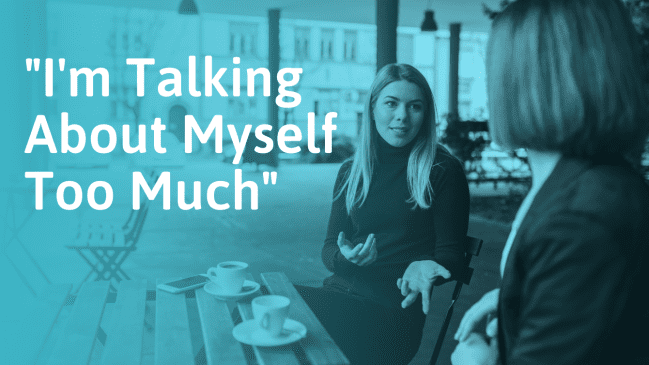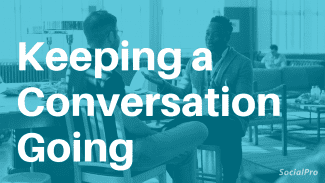Whenever I talk to someone, and they mention something I like, I get excited. I start sharing my own experience, but after the conversation ends, I think that I dominated the conversation by talking about myself. We didn’t end up talking about the original topic. I feel bad. I don’t want to make the people I’m talking to feel like I don’t care about them. How can I cure myself of this talking-about-myself disorder?”
Does this sound like you?
A good conversation is a back-and-forth between the parties involved. In practice, though, they don’t end up a 50-50 split. It’s normal for one person to talk more than the other sometimes, depending on the situation. If someone is going through a rough time or is explaining something, they might take up more space in the conversation.
It’s hard to tell if you’re talking about yourself too much. We might worry that we overshared, but our conversation partners didn’t perceive us that way at all. Your insecurity may be making you overthink your conversations and judge yourself harshly.
However, if you regularly feel that you talk about yourself more than your conversation partner does, there might be something to it. It’s worth learning how to stop talking about yourself too much and instead have more balanced conversations.
How can I tell if I’m talking about myself too much?
Some signs you talk too much can help you determine whether you really do talk about yourself too much:
1. Your friends know more about you than you know about them
You might realize that you don’t know much about what is going on in the lives of friends, coworkers, family, or acquaintances while they know about yours. That’s a good sign that you’re dominating your conversations.
2. You feel relieved after your conversations
If you’re always feeling this way, it may be a sign that conversations are more of a confessional than a discussion.
3. You’ve been told that you’re not a good listener
If someone else has commented that you talk about yourself too much or that you’re not a good listener, there may be something to it.
4. When someone talks, you find yourself focusing on what you’re going to say
A conversation should be an easygoing back-and-forth. If you’re too busy thinking about what you’re going to say, you’re going to miss essential things your conversation partner is sharing.
5. Your instinct is to defend yourself when you feel misunderstood
It’s normal to want to defend ourselves, but it often leads to a position where we are making something about ourselves when it shouldn’t be.
6. You find yourself regretting things that you’ve said
If you often come out of conversations regretting things you’ve shared, you might be oversharing out of nervousness or an attempt to connect.
Do you find yourself in these statements? They can give a good indication that your conversations are unbalanced.
The first step in creating equal conversations is to understand the reasons why you’re talking about yourself too much in the first place.
Why am I talking about myself so much?
Some reasons people might find themselves talking about themselves too much are:
1. They feel nervous when talking to other people
“Motormouth” is a common nervous habit, where it’s hard to stop once you get started. Rambling can be especially common in people with ADHD, due to impulsive behavior.[1] Someone might ask you how you are, and you find that the short story you wanted to share turned into a seemingly non-stop monologue. Someone who is shy or nervous about speaking to other people might then paradoxically find themselves talking too much in conversations.
2. They feel too shy to ask questions
Some people don’t feel comfortable asking people questions. It might come from a fear of rejection. They might be afraid of appearing nosy or making the other person uncomfortable or angry. So they talk about themselves instead of asking questions that might seem too personal.
3. They don’t have other outlets for their emotions
Sometimes, when we have a lot going on and no one to talk to, we can feel that we’re sharing too much when someone asks us what’s going on. It’s as if someone has opened the floodgates and the current is too strong to stop. It’s normal to want to share our lives with others, and we might find ourselves jumping at the few opportunities we get.
4. They want to connect through shared experiences
People tend to bond over things that we have in common. When the person we’re talking to is sharing a tough time they went through, we might offer up a similar experience to show that we empathize with them. This is a tactic that comes from a good intention, but it can sometimes backfire.
5. They want to appear knowledgeable or interesting
We all want to be liked, especially by someone that we want to connect with. Some people talk a lot about themselves out of a desire to appear exciting. This urge to impress can lead to unintentionally dominating the conversation.
Those are just some of the reasons why someone might be talking too much.
Now you might be asking yourself, “that’s all great, but how do I stop talking about myself too much?” Awareness is the first step. Next, you can start to take action.
How to connect without talking too much about yourself
1. Remember that people like to talk about themselves
When discomfort about asking questions shows up, remind yourself that it’s OK. The person that you’re talking to will probably appreciate your interest. If there’s anything that they feel uncomfortable sharing, they will tell you. Note your insecurity, but don’t let it dictate your actions.
2. Think of questions that you would like to ask
If you know that you’re going to meet up with someone, think about what you would like to know about them. Don’t see it like an interview: once they answer one of your questions, let that flow into a new conversation.
For example, say you’ve decided to ask your classmate if they have siblings and what kind of music they like. You don’t have to ask both questions back-to-back in the same conversation. If they say they have siblings, you can ask follow-up questions, like “are they older or younger? Are you close to them?” If they’re an only child, you can ask if they enjoy it, or would they have wanted to have a brother or sister.
3. Pay attention to missing details
When a coworker is telling you about a problem they’re having with their dog, you might be tempted to say, “oh, my dog used to do that!” While that’s a normal response, you can ask questions to connect further. Instead of following up with what happened with your dog, you can say instead, “my dog used to do that, it was really tough. How are you handling it?” Stay curious and ask for more details where applicable. In this example, you can ask your coworker how long they’ve had the dog, or what type of breed it is.
4. Show that you listen and remember
Bringing up something that your conversation partner previously mentioned will most likely make them feel heard and validated. Let’s say that the last time that you’ve talked, your friend said that they’ve been busy studying for an exam. Asking them, “how did that exam go?” will show them that you listened and cared enough to remember. They’re likely to then go into details and share whether or not they feel they did well.
5. Practice pausing before speaking
It’s easy to get caught up in conversation and let one sentence lead to another without much thought. Before we know it, we’ve been talking for several minutes. Practice pausing and breathing as you speak. Pausing will prevent you from getting too caught up in what you’re saying. Taking deep breaths during the conversation will help you stay calm and avoid rambling due to nervousness
6. Give compliments
Pay attention to things you appreciate about the other person, and let them know about it. If you thought they sounded confident when they spoke in class, share that with them. Tell them that you think their shirt color looks good on them. Congratulate them for scoring a goal in the game or getting an answer right in class. People like getting compliments, and it’s likely to make them feel more connected to you. We appreciate people who appreciate us. Make sure to be honest with your compliments. Don’t say something just for the sake of it.
7. Journal, see a therapist, or both
If you think that lack of emotional outlets leads you to overshare in conversations, try and find other places where you can vent. Keep a regular journal where you write about what’s going on in your daily life, and talk to a professional to process difficult events. This will prevent you from oversharing in a conversation when you’re just trying to connect.
8. Ask their opinion
If you find that you have been talking about yourself for a while, you can pause and ask your conversation partner what they think. If you’ve been talking about an experience that you’ve had, you might ask, “have you ever had something similar happen to you?” instead. Give them opportunities to share their own experience. They might be too shy to do it of their own accord and are just waiting for an invitation.
9. Practice some prepared answers
If you find yourself oversharing and unable to stop, think of some answers and “safe” topics in advance. If you’re going through a tough time and someone asks, “what’s been going on lately?” you might feel put on the spot and say, “my dog is sick and I don’t know how to pay for the surgery. My brother won’t help, and I’m so stressed I can’t sleep, so my grades are slipping…” You might come away from the conversation feeling ashamed for sharing so much. You might instead say something like, “it’s a stressful time for me, but I’m doing OK. How are you?” If the person you’re talking to is interested and you feel comfortable, you can share more as the conversation continues.
You can think in advance of general things you can share. For example, maybe you don’t want to tell your parents about the fact that you’re trying to date. If they ask you what’s new, you might feel comfortable sharing that you have a new plant or about the book that you’re reading. Make a list of “safe” topics that you can mention without going into a long vent.













